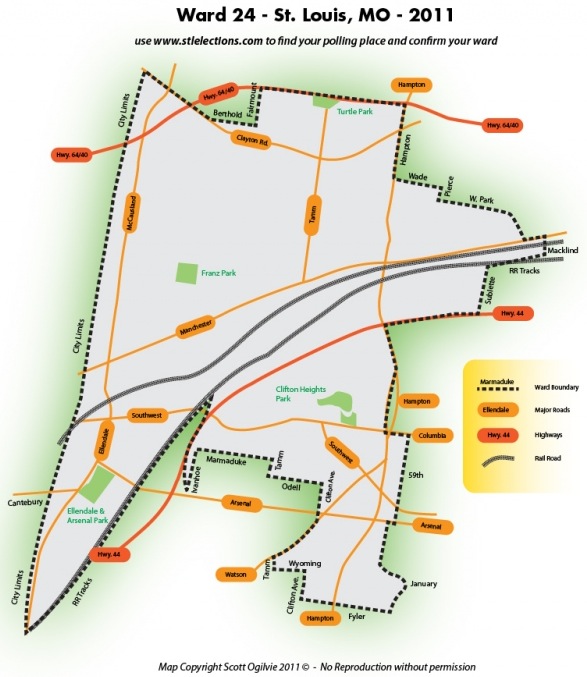Thoughts On Tuesday’s Elections

I couldn’t be happier that independent Scott Ogilvie defeated Democrat Tom Bauer in the 24th ward with 61.46% of the vote, impressive! Â Hard to say how he would have done if Waterhouse had won the Democratic primary in March. Still I’m very optimistic about the future of St. Louis based on this one race.
For those in odd numbered wards start planning to run now. Â Remember redistricting may change which ward you are in. Â The last time I went from being in the 13th to the 25th. Â Some of you in even numbered wards may end up in an odd ward, so you could run in 2013. Â I really want more independent candidates in 2013.
32 year Republican alderman Fred Heitert lost to Democrat Larry Arnowitz in the 12th ward. Â Nothing personal against Heitert but he was first sworn into office in 1979. Â Carter was President, disco music was popular. Â He stayed in office way too long.
Thomas Villa was elected to fill the vacant seat in the 11th Ward following the resignation of Matt Villa. Â Did you expect someone other than a Villa?
Voters approved five more years of the city’s earnings tax with 87.55% saying yes. Kansas City voters also approved a proposition to continue their earnings tax. Both cities have five years to evaluate their sources of revenue and their expenses to see if alternates would be any better.
Looking at the election results in St. Louis County reminds me why consolidation needs to happen — 37 pages long! The number of municipalities, school districts and fire districts is maddening. Just like in St. Louis, many of these races only have a single candidate.
State Rep Jake Zimmerman was elected accessor for St. Louis County — the first time the position has been an elected office in over 50 years.
– Steve Patterson
I don’t know enough about the 24th ward to comment, but in a general sense it’s great to get some new blood elected.
I don’t know enough about the 24th ward to comment, but in a general sense it’s great to get some new blood elected.
Of all of the reasons for consolidation, 37 pages of voting results wouldn’t be one of them. This translates into small scale involvement by citizens in their political future. That should be a good thing.
To put it in other terms, if consolidation of the Board of Alderman took place and was dropped down to 12 or 15 members, it is less likely Scott Ogilivie would have been elected. The alderman races would be probably become big money, special interest positions, leaving out independents like Scott. You better be careful what you wish for.
Of all of the reasons for consolidation, 37 pages of voting results wouldn’t be one of them. This translates into small scale involvement by citizens in their political future. That should be a good thing.
To put it in other terms, if consolidation of the Board of Alderman took place and was dropped down to 12 or 15 members, it is less likely Scott Ogilivie would have been elected. The alderman races would be probably become big money, special interest positions, leaving out independents like Scott. You better be careful what you wish for.
Agree. Reading an article in the P-D yesterday, where there was a discussion about reducing the size of the Missouri House from 163 to 103 members, it pointed out a wide variation across the country, from a low of 49 in Nebraska to a high of 424(!) in New Hampshire. The number of legislators is less critical than, and has no direct correlation to, how efficiently services are delivered. In reality, voters are mostly disengaged from the legislative side of government, and much more concerned about the quality of the services they receive, be they schools, fire protection or parks.
Agree. Reading an article in the P-D yesterday, where there was a discussion about reducing the size of the Missouri House from 163 to 103 members, it pointed out a wide variation across the country, from a low of 49 in Nebraska to a high of 424(!) in New Hampshire. The number of legislators is less critical than, and has no direct correlation to, how efficiently services are delivered. In reality, voters are mostly disengaged from the legislative side of government, and much more concerned about the quality of the services they receive, be they schools, fire protection or parks.